|
“Reflections on Equal Rights
Deferred
and a Shipboard Tragedy”
by Michael F. Hurd
Good morning friends, fellow
citizens, Rev. Bengston, and Rev. Alice, whom I must commend for
her bravery in allowing this old sailor to stand here this
morning. I can assure you I just might be more comfortable
standing out on deck in the middle of a typhoon with green water
breaking over the bow than here at this historic church.
For the past few years Jan Rathbun has asked me whether I might
speak at this Independence Day celebration. Wait a minute; did I
say, “Ask”? I think the more proper word would be “badger!”
Well, no turning back now. But Jan, where’s that tele-prompter
you promised?
My initial dilemma of course was to find a proper subject. I
certainly can’t talk about Colebrook history, not when our
eminent Town Historian, Robert Grigg, has researched and
documented every conceivable aspect of Colebrook imaginable back
to Charlemagne, who he claims rode through the Center around 800
AD! Just kidding Bob. And, as many of you know, two of the most
distinguished living historians in America reside right here in
Colebrook---Dr. Bill MacNeil of the University of Chicago, and
Dr. Eric Foner of Columbia. So now I can’t even talk about the
world! Well I guess there is always outer space, of which I know
very little except for a bit of celestial navigation.
So I have decided to lean on my Navy experience and tell you
about a tragic event that happened aboard my ship in the early
1960s. But what I hope to show is that it is more than just a
“sea story.” It is a consequence of what happens when a certain
segment of our society, either systematically or subtly, is left
behind–left out– denied the American dream!
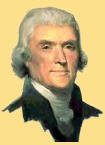 233
years ago a young Virginian was tasked with hammering out
the first draft of a document that would lead this country on
the road to independence. Thomas Jefferson accepted that honor.
He walked down Market Street in Philadelphia to his modest
apartment and, sitting in his Windsor chair and writing on his
small, portable laptop desk (both of which he designed), he put
in writing that historic first draft, which he delivered to John
Adams, Benjamin Franklin, Roger Sherman of Connecticut, and
Philip Livingston of New York. The editing process was painful
for Mr. Jefferson as he sat quietly in the background while
words were changed, ideas reconstructed, and whole sentences
reduced or eliminated. The end result was that over a quarter of
Jefferson’s draft was eliminated (over 600 words), but, about
150 words were also added. 233
years ago a young Virginian was tasked with hammering out
the first draft of a document that would lead this country on
the road to independence. Thomas Jefferson accepted that honor.
He walked down Market Street in Philadelphia to his modest
apartment and, sitting in his Windsor chair and writing on his
small, portable laptop desk (both of which he designed), he put
in writing that historic first draft, which he delivered to John
Adams, Benjamin Franklin, Roger Sherman of Connecticut, and
Philip Livingston of New York. The editing process was painful
for Mr. Jefferson as he sat quietly in the background while
words were changed, ideas reconstructed, and whole sentences
reduced or eliminated. The end result was that over a quarter of
Jefferson’s draft was eliminated (over 600 words), but, about
150 words were also added.
In the second paragraph, which most agree is the most eloquent;
it states that all men are created equal (that’s a simplistic
statement I know, but we understand the meaning) and that we are
endowed by our creator with certain unalienable rights. When
those rights are denied, deferred, there will be consequences,
and that is what I hope to show this morning.
In the early 1960s
I was serving aboard a destroyer in the
Western Pacific as Anti-Submarine Warfare Officer. We were
operating with Carrier Task Force 77, a part of the 7th Fleet.
The cold war was in full bloom with both the Soviets and Chinese
saber rattling at a higher than normal level. We were often
operating at Condition III, which is a high state of readiness
just below general quarters.
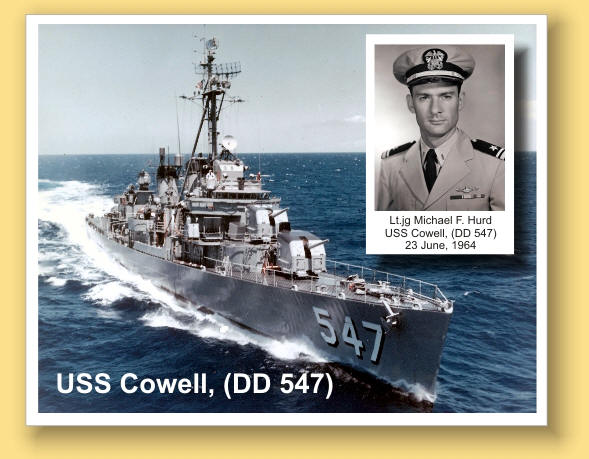
After about 50 days of at-sea operations my ship and three
others (consisting of a Division) were ordered into port for a
much needed two-week stand-down for upkeep and repair, and of
course R&R for the crew. So we set a course for Japan entering
the naval port of Sasebo, mooring alongside a repair ship
(destroyer tender)– four ships in a nest with my ship being
outboard.
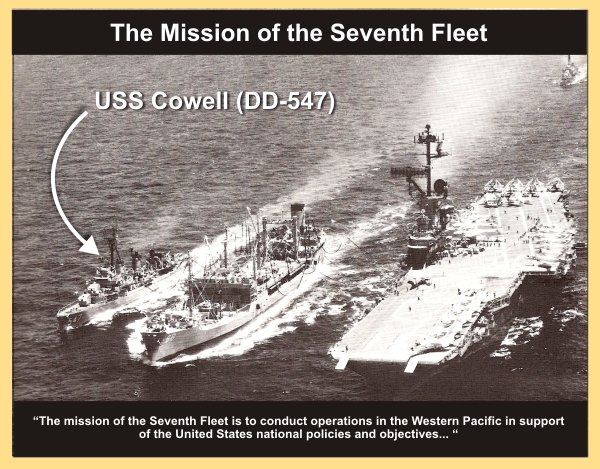
Now a little reflection. The late 1950s and early 1960s were
turbulent years from a civil rights perspective. Although
President Truman had ordered the end of racial segregation
within the military in 1948, the progress was slow and certainly
incomplete. If I had to grade the overall progress in the
military during the early1960s, and this is my own personal
opinion, I would assign, probably, a “C” minus overall. Without
question, the Army had made the most advances with the Marine
Corps and Air Force to a lesser degree. The Navy, sadly, was
woefully deficient, and again, in my judgment, although I can’t
bring myself to flunk my fellow service, I would assign the Navy
a “D” or “D” minus. There are many reasons for this, but they
are outside the scope of this talk. I will say, however, that
shipboard life is unique and could be a hard sell for many.
But in all fairness, we must look at our Nation during this
time. It is often stated, and I agree, the military is in great
part a reflection of our Nation as a whole. I think if you were
to examine fire departments, corporate America, police
departments, government agencies, and even athletics, you could
sum up the results with one word–EXCLUSION!
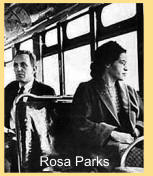 Let’s remember ladies and gentlemen, it took the President of
the United States, backed by Federal troops, to admit the first
African American Let’s remember ladies and gentlemen, it took the President of
the United States, backed by Federal troops, to admit the first
African American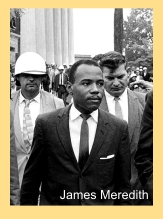 undergraduate to the University of Mississippi!
That person– James Meredith–a courageous man. How about Rosa
Parks? She had no idea she was destined for immortality and
would forever be a part of our nation’s history. She merely
wanted to take a bus to go home after a hard day at work only to
have the bus driver walk back, order her out of her seat and to
give it to a white person. Hard to believe isn’t it? undergraduate to the University of Mississippi!
That person– James Meredith–a courageous man. How about Rosa
Parks? She had no idea she was destined for immortality and
would forever be a part of our nation’s history. She merely
wanted to take a bus to go home after a hard day at work only to
have the bus driver walk back, order her out of her seat and to
give it to a white person. Hard to believe isn’t it?
How about the freedom riders? Thirteen citizens,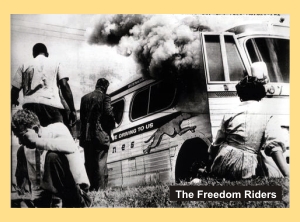 male and
female, white and black, boarding a bus in Washington, DC, with
a destination of New Orleans, who were demonstrating
against segregation within interstate travel. Did you know that
it was illegal for a black person to sit next to a white in some
southern states? The freedom riders never reached their
destination! In Alabama they were firebombed and took refuge in
a local church. More joined the crusade but got no further than
Mississippi where they were stopped, many beaten and jailed. male and
female, white and black, boarding a bus in Washington, DC, with
a destination of New Orleans, who were demonstrating
against segregation within interstate travel. Did you know that
it was illegal for a black person to sit next to a white in some
southern states? The freedom riders never reached their
destination! In Alabama they were firebombed and took refuge in
a local church. More joined the crusade but got no further than
Mississippi where they were stopped, many beaten and jailed.
 Lastly, the great march on Washington where over 250,000 men and
women, white and black, young and old, marched on our Nation’s
capital essentially for one reason—equal rights under the law,
and to persuade Congress to pass the President’s Civil Rights
Bill. Lastly, the great march on Washington where over 250,000 men and
women, white and black, young and old, marched on our Nation’s
capital essentially for one reason—equal rights under the law,
and to persuade Congress to pass the President’s Civil Rights
Bill.
Okay, I’m sure you’re wondering– where are we going with all
this? Mike, I thought we were going to hear a “sea story”!
Well, you are, but it was important to first briefly refresh our
memories of the racial climate that existed in the early 1960s.
At this time I’d like to introduce to you a man by the name of Demetrius Watson. I considered not using his real name but I
just couldn’t bring myself to do that given the strength of his
name and his presence. Watson was a Seaman Steward’s Mate aboard
my ship. Physically, he was a powerful man. At the time I
equated him in size to Sonny Liston, the heavyweight boxer. For
those of you who may not know of, or, remember him– in today’s
world I’d say he was about the size of David Ortiz, Big Papi,
of the Red Sox. A big man, black, who hailed from Boston, he
was also good sailor, hard working, well respected, and as I
recall, was an ammunition handler during General Quarters.
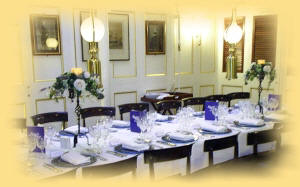 For those of you who may not be all that familiar with the
running of the wardroom aboard a destroyer
and many other
classes of ships in the Navy, let me briefly explain. Stewards
in the Navy at that time were–almost exclusively– either African
Americans or Filipinos. Stewards are tasked with ordering the
food and supplies, preparing the food, serving the food to the
officers in the wardroom, besides maintaining the officers’
living quarters–called “Officer’s Country.” The officers sit at
a long table covered (always) with a white linen table cloth,
silverware, and are seated in order of seniority with the
captain at the head of the table and so on down by rank. I was
somewhere in the middle. Some captains choose not to eat with
their officers and will take their meals in either their sea
cabin or in-port cabin. During mealtime each officer is
individually served by stewards in crisp, white jackets. You get
the picture. For those of you who may not be all that familiar with the
running of the wardroom aboard a destroyer
and many other
classes of ships in the Navy, let me briefly explain. Stewards
in the Navy at that time were–almost exclusively– either African
Americans or Filipinos. Stewards are tasked with ordering the
food and supplies, preparing the food, serving the food to the
officers in the wardroom, besides maintaining the officers’
living quarters–called “Officer’s Country.” The officers sit at
a long table covered (always) with a white linen table cloth,
silverware, and are seated in order of seniority with the
captain at the head of the table and so on down by rank. I was
somewhere in the middle. Some captains choose not to eat with
their officers and will take their meals in either their sea
cabin or in-port cabin. During mealtime each officer is
individually served by stewards in crisp, white jackets. You get
the picture.
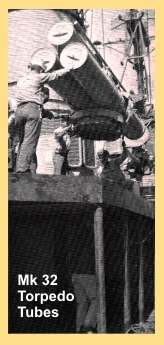 Now I’d like to back up about 4 months. We were in transit from
our home port in California to the Western Pacific and had just
departed Hawaii en route to Midway Island where we would briefly
stop for fueling, take on needed supplies, and pick up crew
members who would be joining the ship. One day while transiting
this long expanse of Pacific Ocean, Watson approached me
stating, “Mr. Hurd, can I have a few words with you?” I said,
“Of course Watson, what’s on your mind?” “Well,” he said, “I’d
like to change my rate to Torpedoman’s Mate.” I asked him if he
had discussed this with his Division Officer, as this would be
the proper chain of command for him to follow. He said no and
that he would prefer to work through me. I mentioned that that’s
fine but I would let his Division Officer know and would inform
the XO (Executive Officer) of our plan. The first thing I
mentioned to him was that we must check his service record in
the ship’s office to be sure he meets all the test score
requirements–which he did by the way. I assured him that I would
help him with the application process and that I felt we could
get a good recommendation from the Captain, and that the
application should be ready for mailing to the Bureau of Naval
Personnel in Washington by the time we reached Midway Island. Now I’d like to back up about 4 months. We were in transit from
our home port in California to the Western Pacific and had just
departed Hawaii en route to Midway Island where we would briefly
stop for fueling, take on needed supplies, and pick up crew
members who would be joining the ship. One day while transiting
this long expanse of Pacific Ocean, Watson approached me
stating, “Mr. Hurd, can I have a few words with you?” I said,
“Of course Watson, what’s on your mind?” “Well,” he said, “I’d
like to change my rate to Torpedoman’s Mate.” I asked him if he
had discussed this with his Division Officer, as this would be
the proper chain of command for him to follow. He said no and
that he would prefer to work through me. I mentioned that that’s
fine but I would let his Division Officer know and would inform
the XO (Executive Officer) of our plan. The first thing I
mentioned to him was that we must check his service record in
the ship’s office to be sure he meets all the test score
requirements–which he did by the way. I assured him that I would
help him with the application process and that I felt we could
get a good recommendation from the Captain, and that the
application should be ready for mailing to the Bureau of Naval
Personnel in Washington by the time we reached Midway Island.
BUT, I also advised him that the likelihood of success in
obtaining approval from Washington was very slim and I gave him
an example. If, for example, I wanted to change my designator
from line officer to supply officer, I would most likely be
denied. The Navy has spent a lot of money and time training me
in engineering, seamanship, navigation, gunnery, surface
warfare, etc., and they would not be in favor of starting all
over in supply, which would be over a year of training. The same
applies when requesting a rating change within the enlisted
ranks. Watson understood the odds but we agreed to go forward
with the application, which left the ship for Washington.
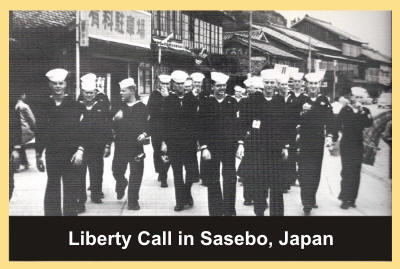 Now back to Sasebo, Japan, where as I mentioned we are in a nest
of 4 destroyers, moored alongside a destroyer tender, and I have
the duty. I am second in seniority within the duty section, just
under the Command Duty Officer. About 1630 (4:30 pm) liberty
call was piped down and as the liberty party assembled on the
quarterdeck it was my task to make a casual inspection of
uniforms and remind those going ashore that they are all
ambassadors of their country and should act accordingly.
Remember the “buddy system” and always obey the shore patrol,
who are there to protect you. What I didn’t know at that time
was that Watson’s request for a rate change had arrived from
Washington that day and it had been denied. He went ashore a
very, very angry man! Had he come to me maybe we could have
discussed the issue and the appeal process–and– just maybe,
maybe–the tragic events that were about to unfold could have
been averted. Now back to Sasebo, Japan, where as I mentioned we are in a nest
of 4 destroyers, moored alongside a destroyer tender, and I have
the duty. I am second in seniority within the duty section, just
under the Command Duty Officer. About 1630 (4:30 pm) liberty
call was piped down and as the liberty party assembled on the
quarterdeck it was my task to make a casual inspection of
uniforms and remind those going ashore that they are all
ambassadors of their country and should act accordingly.
Remember the “buddy system” and always obey the shore patrol,
who are there to protect you. What I didn’t know at that time
was that Watson’s request for a rate change had arrived from
Washington that day and it had been denied. He went ashore a
very, very angry man! Had he come to me maybe we could have
discussed the issue and the appeal process–and– just maybe,
maybe–the tragic events that were about to unfold could have
been averted.
About 9:30 that evening I made my required rounds of the ship
ensuring various spaces were secure. From after steering to the
fo’c’sle, to the birthing compartments and engineering spaces,
all was ship-shape. I made my report to the quarterdeck and went
up to the wardroom to inform Lt. Hall, the Command Duty Officer,
that all was secure and that I was going below and would soon be
turning in for the night.
 As I settled at my desk in my stateroom I had just picked up a
pen to get a quick note off to Judy when the silence was broken
by the 1MC (general announcing system), “Lt. Hall, Lt. (jg) Hurd,
lay to the quarterdeck immediately, lay to the quarterdeck on
the double.” Well, I can assure you that in all my years in the
Navy, never have I heard such a command. I knew something was
very wrong. I put on my foul weather jacket and cap, shot up the
ladder to the main deck and dashed down the starboard side to
the quarterdeck with Lt. Hall just behind me. As I approached
the quarterdeck my brain almost didn’t accept what I was seeing.
On the deck was the Officer of the Deck (actually a first class
petty officer, but assigned Officer of the Deck). He was flat on
his back, semi-conscious, moaning, and bleeding from the mouth.
“Alright, what’s happened,” I asked the petty officer of the
watch. He said that Watson has come aboard, very drunk, got into
an argument with the watch members and hit the Officer of the
Deck. What later came out in the investigation that followed was
that the Officer of the Deck ignited the spark that sent Watson
into a rage. When Watson was being unruly on the quarterdeck,
the Officer of the Deck used the most improper words imaginable
by saying, “Hey boy, go below!” With that the violence erupted. As I settled at my desk in my stateroom I had just picked up a
pen to get a quick note off to Judy when the silence was broken
by the 1MC (general announcing system), “Lt. Hall, Lt. (jg) Hurd,
lay to the quarterdeck immediately, lay to the quarterdeck on
the double.” Well, I can assure you that in all my years in the
Navy, never have I heard such a command. I knew something was
very wrong. I put on my foul weather jacket and cap, shot up the
ladder to the main deck and dashed down the starboard side to
the quarterdeck with Lt. Hall just behind me. As I approached
the quarterdeck my brain almost didn’t accept what I was seeing.
On the deck was the Officer of the Deck (actually a first class
petty officer, but assigned Officer of the Deck). He was flat on
his back, semi-conscious, moaning, and bleeding from the mouth.
“Alright, what’s happened,” I asked the petty officer of the
watch. He said that Watson has come aboard, very drunk, got into
an argument with the watch members and hit the Officer of the
Deck. What later came out in the investigation that followed was
that the Officer of the Deck ignited the spark that sent Watson
into a rage. When Watson was being unruly on the quarterdeck,
the Officer of the Deck used the most improper words imaginable
by saying, “Hey boy, go below!” With that the violence erupted.
 Just about then we heard loud scuffling and shouting below in
the area of the after birthing compartment and suddenly a sailor
raced up stating that Watson had a gun and was about to shoot
someone. With that, to my complete amazement, Lt. Hall said he
was going for assistance and will try to locate the captain and
he left the ship. Well, I’m sure there isn’t a person here today
that doesn’t know that the senior in command does not leave the
ship. He sends a messenger–not himself. Now it’s me–I’m
in-charge by default! At that time in the 1960s we were in a
relative high state of readiness and the bow and stern sentries
each carried an M-1 rifle with ammunition on their belt. I
ordered the messenger of the watch to inform the two sentries to
load their rifles, and informed them that Watson had a gun and
that they have my permission to shoot Watson if he threatens
them or anyone else. Just about then we heard loud scuffling and shouting below in
the area of the after birthing compartment and suddenly a sailor
raced up stating that Watson had a gun and was about to shoot
someone. With that, to my complete amazement, Lt. Hall said he
was going for assistance and will try to locate the captain and
he left the ship. Well, I’m sure there isn’t a person here today
that doesn’t know that the senior in command does not leave the
ship. He sends a messenger–not himself. Now it’s me–I’m
in-charge by default! At that time in the 1960s we were in a
relative high state of readiness and the bow and stern sentries
each carried an M-1 rifle with ammunition on their belt. I
ordered the messenger of the watch to inform the two sentries to
load their rifles, and informed them that Watson had a gun and
that they have my permission to shoot Watson if he threatens
them or anyone else.
Seconds later there was a loud shot just above me on the 01
level, the deck just above the main deck. As I looked up a body
tumbled over the lifeline right above me falling virtually at my
feet. I could see that the man had been shot in the center of
his face right below his nose. He wasn’t moving and was either
unconscious or, worse yet, dead. We heard Watson scramble
forward moving stealthily in the dark. I then ordered the petty
officer of the watch, a crusty second class gunner’s mate with
about 18 years in the Navy with almost every inch of exposed
skin covered with weathered tattoos, to load his .45 caliber
pistol and put a round in the chamber. Which he did. Then I
asked him point blank, “Do you have any reservations about using
your weapon?” “No sir,” was his answer. “No sir, none at all.”
Then I told him that if he did have reservations that was not a
problem and for him to give me the weapon. He affirmed he would
use it if necessary. No reservations!
I informed him and the members of the watch that we (the petty
officer and I) would move forward and search out Watson and
attempt to have him disarm and stop the blood shed. Moving
forward up the starboard side of the main deck with him slightly
behind me and off to my right, out of the darkness there was
this scramble, tumble, wham, bang and Watson had me from behind
with his arm around my neck. Jamming his pistol into the back of
my neck, he stated those 7 words that I shall never forget! “Mr. Hurd, you are a dead man!” watch that we (the petty
officer and I) would move forward and search out Watson and
attempt to have him disarm and stop the blood shed. Moving
forward up the starboard side of the main deck with him slightly
behind me and off to my right, out of the darkness there was
this scramble, tumble, wham, bang and Watson had me from behind
with his arm around my neck. Jamming his pistol into the back of
my neck, he stated those 7 words that I shall never forget! “Mr. Hurd, you are a dead man!”
I wish I could relate to you exactly what I said to Watson
during those tense moments but I don’t remember exactly. Surly I
was attempting to convince him to drop his weapon, stop the
bloodshed, and don’t make a bad situation worse. He continued to
rough me up a bit and jammed the pistol into the back of my
neck. The thought occurred to me to attempt the one judo move
that I had practiced in the past, but he had the gun and I
didn’t. Almost assuredly that would have forced him to shoot and
I’d be out of action to say the least. Then all of a sudden as I
contemplated that move the situation changed. Watson left me!
For whatever reason, he started moving forward up the starboard
side of the ship toward the fo’c’sle.
Now, before I continue with this saga, you might be wondering,
hey, how about that petty officer with the loaded pistol who was
alongside me for support and protection? Well, my friends,
you’ll never guess what happened. He fainted! That’s right, when
Watson jumped down off the ladder from the 01 level slamming
into the petty officer, he fainted straight away. This I didn’t
learn until the follow-on investigation. Although you can be
certain I was less than happy with his performance, I learned
later that fainting is really an unconditioned response of which
he had no control.
As Watson moved forward and stepped through the weather break on
the main deck, I darted to the bridge several decks up. From the
bridge I could see Watson slowly stalking forward in the dark
and I called down to the bow sentry, Seaman Electronics
Technician Wall, informing him of Watson’s movements. I again
issued the order that he had permission to shoot Watson if
Watson attempted to shoot him or attempted to go below. Seaman
Wall, a cool, intelligent young lad had Watson squarely in the
cross hairs of his M-1 rifle ordering him to drop his weapon.
Watson continued to slowly inch forward toward the open hatch
holding his pistol in the air above his head and peeking over
his left shoulder at Seaman Wall. Kind of a cat and mouse act.
Ignoring Wall’s command to drop his weapon, Watson placed his
right foot on the top wrung of the ladder, swung around to his
left to shoot Wall when Wall fired his M-1 hitting Watson in the
hip area driving him down the ladder where he lay unconscious.
(Later during the investigation, we learned that Wall had aimed
for Watson’s chest area but at the last second chose to lower
his rifle, probably saving Watson’s life.)
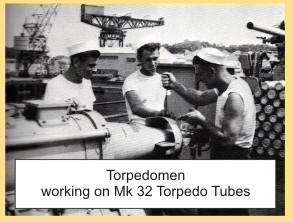 Just as Watson was being carried off the ship over to the
fully-equipped hospital room on the destroyer tender, the
captain came aboard with a forlorn look, and putting his hand on
my shoulder asked, “Mike what in the world has happened?”
Shortly afterwards the Naval Investigative Service (NIS) came
aboard, separated all the principal participants, and had us all
write up our accounts of the episode. With our two-week upkeep
completed, the other 3 ships of the division got underway to
resume operations with the 7th Fleet, and my ship remained in
port to answer to a Board of Investigation. Just as Watson was being carried off the ship over to the
fully-equipped hospital room on the destroyer tender, the
captain came aboard with a forlorn look, and putting his hand on
my shoulder asked, “Mike what in the world has happened?”
Shortly afterwards the Naval Investigative Service (NIS) came
aboard, separated all the principal participants, and had us all
write up our accounts of the episode. With our two-week upkeep
completed, the other 3 ships of the division got underway to
resume operations with the 7th Fleet, and my ship remained in
port to answer to a Board of Investigation.
As is the procedure within the military,
whenever there is an accident, man lost overboard, someone
injured or killed, or a collision at sea, etc., it is cause for
a Board of Investigation to look into the facts surrounding the
incident, analyze the soundness of the procedures, and to
determine if the correct procedures were in fact followed, etc.
Just as you all have probably seen in the various naval movies,
the board was convened ashore at the Administrative Headquarters
in Sasebo around a long table covered with a green felt cloth,
pad and pencil in front of each board member along with water
glasses...and lots of brass, JAG officers, stenographer, and
other participating members. There was no chair for me. I was
waiting outside in the passageway ready to be called, to stand
at attention, and to testify and explain my actions as the
principal participant. Although I disregarded his
recommendation, my direct boss, the Weapon’s Officer, a rather
hard-nosed, cigar smoking Texan, suggested that I get legal
representation...just in case. Since I felt that I had done
nothing legally wrong, I felt secure in defending my actions
without any JAG assistance.
As I was waiting to be called, I glanced down the passageway and
to my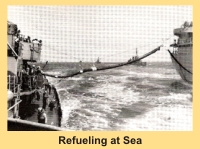 surprise; I saw a Marine Corps guard and a Navy corpsman
wheeling Watson toward the room where the hearing was about to
start. Just as they approached me, Watson, who was covered with
a traditional white U.S. Navy blanket, leaned slightly toward me
and in a soft and remorseful voice said, “Oh, Mr. Hurd, I am so
sorry I let you down.” I’m normally not lost for words but at
that moment all I could muster up was, “Don’t worry about me
Watson, take care of yourself.” surprise; I saw a Marine Corps guard and a Navy corpsman
wheeling Watson toward the room where the hearing was about to
start. Just as they approached me, Watson, who was covered with
a traditional white U.S. Navy blanket, leaned slightly toward me
and in a soft and remorseful voice said, “Oh, Mr. Hurd, I am so
sorry I let you down.” I’m normally not lost for words but at
that moment all I could muster up was, “Don’t worry about me
Watson, take care of yourself.”
Shortly thereafter I was called in to testify and answer
questions from the board. Strange as it may sound, if there was
a comical moment during this whole ordeal, it was about to
happen. You see, Watson was very interested to hear my testimony
as he remembered very little, if anything at all, of what had
happened that fatal night due to the amount of alcohol he had
consumed and, of course, the trauma of being shot. So, as I was
describing the incident at the point where Watson had just left
me on the main deck and he was inching his way forward in the
dark, I guess my voice must have trailed off and he couldn’t
hear my testimony. In his attempt to hear me, he leaned too far
over and the entire gurney overturned with the loudest slam
causing all the board members to leap out of their seats
thinking a bomb went off. Once they realized what had happened,
and with a bit of embarrassment, they sat back down resuming
their stern faces and the investigation resumed. Watson survived
the fall but was in considerable discomfort.
Charged with several violations of the Uniform Code of Military
Justice, Watson, who was sent to the Great Lakes Naval Hospital,
was later tried before a General Court-Martial and sent to
prison. As for my actions, although I was grilled pretty
thoroughly during the inquiry, nothing came of it, good or bad,
and I continued on with my naval career without any
consequences.
 In closing ladies and gentlemen, during the last election we
heard a lot about “change,” and then witnessed one of the most
remarkable political events with the election of a new
Commander-in-Chief, an African American President! Something one
couldn’t even begin to dream of happening in the 1960s. In closing ladies and gentlemen, during the last election we
heard a lot about “change,” and then witnessed one of the most
remarkable political events with the election of a new
Commander-in-Chief, an African American President! Something one
couldn’t even begin to dream of happening in the 1960s.
As we look back to those dark, troubled times of the 1960s, I am
pleased to say that impressive improvements have taken place in
the U.S. Navy. To begin with, the steward rating has been
restructured, all ratings are now open to qualified enlisted men
and women (black and white), and minority population has been
steadily increasing within the officer corps through entry
points such as the Naval Academy, NROTC participating colleges
and universities, Naval Flight School, and Officer Candidate
School. Just think----minorities have flown our finest aircraft,
commanded just about every class of ship in the Navy’s
inventory, and have flown into space and reached flag rank.
That’s progress!
Within the submarine service, in which I served and try to stay
somewhat informed, seven African Americans have commanded
nuclear submarines, three of whom have reached flag rank–one
going from the enlisted ranks to vice admiral! Today, as I
speak, two nuclear powered submarines prowl the oceans under the
command of black skippers. We have indeed made progress.
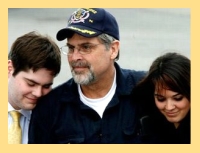 Lastly--- probably you all have either seen on television or
read in the newspapers, the recent dramatic rescue of Captain
Philips, skipper of the merchant ship Maersk Alabama in the Gulf
of Aden. What you might not have learned from the media is that
the operation to rescue Capt. Philips from the Somali pirates
was under Counter-Piracy Task Force (CTF) 151, which is
comprised of multi-national ships from several participating nations including Russia. Command of CTF 151 is periodically
rotated among the participating nations and is headed by a rear
admiral. Lastly--- probably you all have either seen on television or
read in the newspapers, the recent dramatic rescue of Captain
Philips, skipper of the merchant ship Maersk Alabama in the Gulf
of Aden. What you might not have learned from the media is that
the operation to rescue Capt. Philips from the Somali pirates
was under Counter-Piracy Task Force (CTF) 151, which is
comprised of multi-national ships from several participating nations including Russia. Command of CTF 151 is periodically
rotated among the participating nations and is headed by a rear
admiral.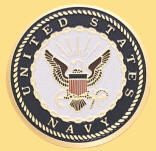 During the rescue operation of Capt. Philips, CTF 151
was under the command of an American Rear Admiral, an African
American Rear Admiral.... and..... HER name is Michelle Howard,
the first woman graduate at Annapolis (white or black) to reach
flag rank! A star of the first magnitude from whom we shall
likely hear more in the future. During the rescue operation of Capt. Philips, CTF 151
was under the command of an American Rear Admiral, an African
American Rear Admiral.... and..... HER name is Michelle Howard,
the first woman graduate at Annapolis (white or black) to reach
flag rank! A star of the first magnitude from whom we shall
likely hear more in the future.
Thank you, and we thank those who gave us our freedom and those
who do so today. |